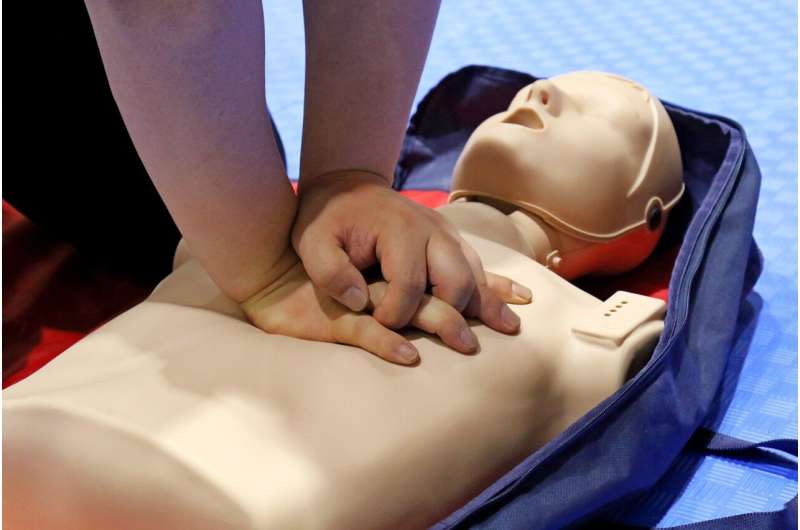This article has been reviewed according to Science X's editorial process and policies. Editors have highlighted the following attributes while ensuring the content's credibility:
fact-checked
peer-reviewed publication
trusted source
proofread
Researchers estimate survival chances during CPR for cardiac arrest

A person's chance of surviving while receiving cardiopulmonary resuscitation (CPR) for cardiac arrest in hospital declines rapidly from 22% after one minute to less than 1% after 39 minutes, finds a US study published by The BMJ today.
Similarly, the likelihood of leaving hospital with no major brain damage declines from 15% after one minute of CPR to less than 1% after 32 minutes with no heartbeat.
The researchers say the findings provide insights that may help guide hospital teams, patients and their families in deciding how long to continue resuscitation.
In-hospital cardiac arrest is a common and catastrophic medical emergency, with only around 25% of patients surviving to hospital discharge. Studies have shown that a longer resuscitation time for patients with in-hospital cardiac arrest is linked to lower odds of survival, but experts have been unable to make specific recommendations on when to stop resuscitation.
To address this knowledge gap, researchers measured the effect of CPR duration (in minutes) on outcomes for 348,996 US adults (average age 67 years) who had an in-hospital cardiac arrest between 2000 and 2021. CPR was defined as the interval between the start of chest compression and the first return of spontaneous circulation (ROSC) or termination of resuscitation.
The main measures of interest were survival to hospital discharge and favorable functional outcome at hospital discharge, defined as a brain performance score of 1 (good cerebral performance) or 2 (moderate cerebral disability) on a 5-point scale.
After accounting for potentially influential factors such as age, sex, ethnicity, and a range of pre-existing conditions, the results show that of the 348,996 patients, 233,551 (67%) achieved return of spontaneous circulation with an average CPR duration of 7 minutes, whereas 115,445 (33%) did not achieve return of spontaneous circulation with an average CPR duration of 20 minutes.
At one minute's CPR duration, the probabilities of survival and favorable functional outcome among patients were 22% and 15%, respectively. But as duration of CPR increased, the probabilities of survival and favorable functional outcome decreased to less than 1% for survival at 39 minutes and less than 1% for favorable functional outcome at 32 minutes.
These are observational findings and the researchers acknowledge that they relied on the assumption that any termination of resuscitation was appropriate. They also point out that collecting time variables during CPR is difficult and they were unable to account for severity of underlying conditions and quality of CPR or post-resuscitation care at each hospital.
However, they say this was a well-designed study using the largest in-hospital cardiac arrest dataset in the world, making the findings pertinent for hospitals intending to improve their resuscitation performance.
As such, they conclude, "The findings provide resuscitation teams, patients, and their surrogates with insights into the likelihood of favorable outcomes if patients pending the first return of spontaneous circulation continue to receive further cardiopulmonary resuscitation."
More information: Duration of cardiopulmonary resuscitation and outcomes for adults with in-hospital cardiac arrest: retrospective cohort study, The BMJ (2024). DOI: 10.1136/bmj-2023-076019



















